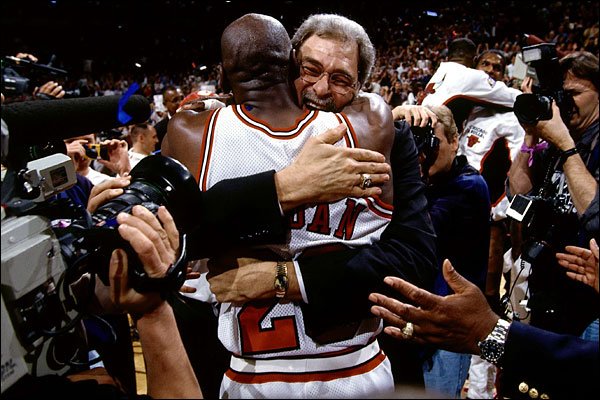Seven Communication Lessons from Legendary Coach Phil Jackson
Phil Jackson and Michael Jordan
Want to be the kind of leader who inspires and motivates people?
Learn to master your communication skills.
I normally gravitate toward books about the skills I’m passionate about helping people develop – communication, creativity, and leadership.
But looking for a break from my usual business fare, I picked up legendary basketball Coach Phil Jackson’s Eleven Rings.
As a coach, Phil Jackson would steer his teams to eleven NBA championships – six with the Chicago Bulls and five with the Los Angeles Lakers. (Thus the title of his book.)
But while I was absorbing the details of how the Bulls implemented the Triangle Offense, and the evolution of Jackson’s relationship with Kobe Bryant, I noticed something interesting.
Eleven Rings IS a book about leadership.
And Jackson understands how important creativity and communication skills are to leadership and success.
His proficiency in both areas is what made him such an incredible coach and leader.
Eleven Rings may not be marketed as a communication resource, but Jackson’s stories highlight important communication lessons for us all.
Here are seven communication lessons inspired by Jackson's stories:
1.Words Matter
In his second season with the Bulls, Michael Jordan broke his foot. He was eager to return to the game, but Bulls General Manager Jerry Krause said no.
Time passed, and Michael felt ready to return to play. Krause still said no, saying that management could make the decision because Michael was ‘their property.’
This unfortunate gaffe alienated Jordan, and tainted his relationship with Krause from that day forward.
Krause’s poor communication skills affected his relationships with both Coach Jackson and the players over the years.
And Krause’s comment to the media that, “Players and coaches don’t win championships; organizations do,” in 1997 didn’t help his relationships either.
2. Be honest and straight-forward
After Scottie Pippen refused to play in the final seconds of a playoff game in New York, his other teammates and Jackson were fuming.
Quiet team leader Bill Cartwright spoke through tears when he addressed Pippen after the game. Cartwright’s honest, heartfelt message got through to Pippen, and the team was able to put the incident behind them and rebound (no pun intended).
3. Get to the point
When Michael Jordan decided to return to basketball (after a stint with Major League Baseball), he issued a press release that was short and to the point.
It was pithy, but told people exactly what they needed to know:
‘I’m back.’
4. Be specific
The Bulls were having a great season in 1995-96, and on their way to winning 70 games.
But their goal was not to win 70 games – it was to win a championship.
And they communicated that – clearly. Even when they managed to win 72 games, Ron Harper came up with the slogan, “72 and 10 don’t mean a thing without the ring.”
They clearly communicated their goal of becoming champions – and they succeeded.
5. Use analogies to illustrate your point
Earlier in his career with the LA Lakers, star player Kobe Bryant was unhappy, and asked team owner Dr. Buss for a trade.
Dr. Buss, a smart and well-respected man, sat down with Kobe and told him: “If I had a diamond of great value, say four carats, would I give it up for four diamonds of one carat each? No. There’s no equal value we can get from a trade that would match what you bring to a team.”
The conversation changed Kobe’s attitude, and he remained with the Lakers for the entirety of his pro career.
6. Adapt your communication style for your audience
Kobe Bryant’s game adapted over his 19 years with the Lakers – and so did his communication style.
Kobe was a player who led by example. He worked harder, rarely missed a game, and expected his teammates to play at his level.
But he couldn’t communicate effectively to get everyone on the same page – and that affected his ability to truly lead.
And then he changed.
He started reaching out to other players, getting to know them, and being more positive and encouraging.
He changed the way he behaved and communicated, and became a true leader for the Lakers.
7. Remember the power of your unspoken communication
Throughout his career, Phil Jackson worked with a lot of players – and he learned the importance of tailoring his communication style to the needs of the individuals he was coaching.
After an incident with player Ron Artest, Jackson learned he also needed to focus on his unspoken communication.
To get the most out of Artest, Jackson would need to couch everything in a positive way, not just the words he used, but also his gestures and facial expressions.
Karl Malone and Scottie Pippen
BONUS: Words Really Matter
The 1990s Bulls were not known to be big trash talkers in the NBA, but Scottie Pippen delivered (possibly) the greatest line of trash talk in Game 1 of the playoffs with the Utah Jazz on Sunday, June 1, 1997.
The score was tied at 82, and there were 9.2 seconds left on the clock.
Karl Malone, the powerhouse of the Jazz (nicknamed ‘The Mailman’ because he always delivered) was fouled, preparing to take two free throws.
As Malone went to the line, Pippen whispered in his ear, “The Mailman doesn’t deliver on Sundays.”
Malone missed the first shot, then the second, and the Bulls managed to win the game.
****************************************************************************
Beth Collier helps companies, leaders and teams improve their communication, creativity, and leadership through consulting, coaching, and workshops.
She brings her clients global corporate experience, Midwestern practicality and enthusiasm – and an endless supply of pop culture references (including a few lessons inspired by sporting greats!).
To find out how she can help you become a more confident, creative, and compelling leader or improve communication in your company, visit www.beth-collier.com or drop her a line at beth@beth-collier.com
__________________________________________
Want a dose of positivity and fun in your inbox?
Sign up to receive my free newsletter, Curious Minds.
Each week you'll get insights that mix curiosity with business, history, or pop culture.





